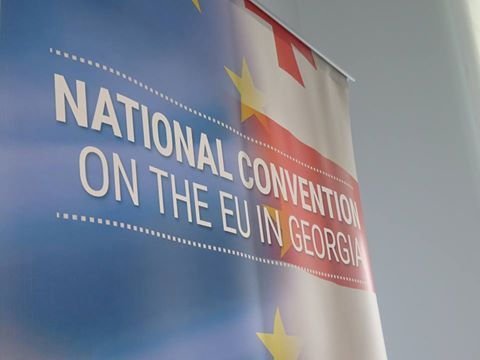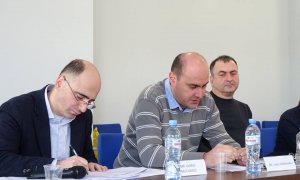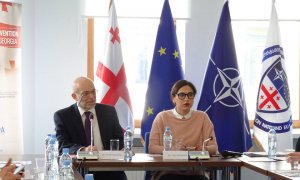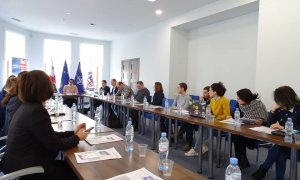On December 20, 2016, the Levan Mikeladze Foundation held the fourth meeting of Strategic Communication working group on the topic “NATO Communication Strategy”. The meeting was organized in the framework of the project - “National Convention on the EU in Georgia”. The project is carried out in partnership with the Slovak Foreign Policy Association (SFPA) and with the financial support of the Slovak Aid and Europe Foundation.
The meeting took place in the Office of Information Center on NATO and EU. It was chaired by Ms. Mariam Rakviashvili, the Deputy State Minister on European and Euro Atlantic Integration and by Mr. David Sikharulidze, Chairman of the Atlantic Council of Georgia.
The working group was composed with representatives of those government institutions and organization, which work directly on NATO related issues or are indirectly linked to this topic. In total, there were 21 organizations represented in the session. These organizations were:
1. Atlantic Council of Georgia
2. East-West Management Institute ACCESS program
3. Embassy of Romania in Georgia
4. Embassy of Slovak Republic in Georgia
5. GCSD
6. GIP
7. Information Centre on NATO and EU
8. Media Development Fund (MDF)
9. National Security Council of Georgia
10. Policy Management Consulting Group (PMCG)
11. Rondeli Foundation
12. The Levan Mikeladze Foundation (LMF)
13. The Ministry of Defence
14. The Ministry of Foreign Affairs
15. The Ministry of Internal Affairs
16. The Ministry of Justice
17. The Office of State Minister of Georgia on European and Euro-Atlantic Integration
18. The Office of State Minister of Georgia for Reconciliation and Civic Equality
19. The Office of State Security and Crisis Management Council
20. The Substantial NATO-Georgia Package
21. USAID/GGI
After the presentation of the outline paper for Strategic Communication of Georgia’s EuroAtlantic Integration, the expert, Mr. Giorgi Muchaidze has continued to work on the first draft of the document. For its presentation, the Slovak expert, Mr. Jaroslav Nad was invited to participate in the meeting and to provide his recommendations regarding the strategy document.
In his comments, Mr. Nad emphasized on the importance of having shorter, more systematic, document as to make most effective use of it. As for the actual content, he suggested to focus on not only Russia and threats related to it but also on Georgia’s other relationships within the region. He compared the goal of this strategy, which is to inform Georgia’s population on NATO-Georgia integration, to the one of Slovakia, in which case the goal was to reach support from the people and to change their attitudes. He suggested, on national level, to work on current supporters and on undecided respondents; as for international level, the emphasized on the importance of support from the USA and Germany. Mr. Nad stated that the involvement of students, retired people and military in the actual campaign would be very beneficial for getting support from the general population. He further advised on inviting professional lobbyists from Washington to assist in this campaign process, part of which should also be door-to-door visits and inclusion of animated video explainers, which in Slovakia’s case, worked very well. He finalized his presentation by urging to work precisely on budgeting, which in end is what will make the strategy a practical case.
The presentations of both Mr. Nad and Mr. Muchaidze were followed by an interesting and thorough discussion. The main dividing issue among the audience was whether the communication strategy for EU and NATO should be under one umbrella document or drafted separately. Arguments supporting the joint document were mainly derived from the fact that although these organizations are different, their values, target groups, and key messages are very alike. Those, who do not agree with this, suggest that given the differences in profiles of these two IOs, including different topics, communication strategy for each should be separate.
Other comments made regarding the strategy document were about its title and size. Most participants agree on the shorter version of the document. As for the title, some suggested to have Euro-Atlantic Membership Communication National Strategy, some said that it should be integration and not membership, some commented that it should be NATO Communication strategy.
As for the content, it was suggested to specify primary and secondary stakeholders and facilitators. Some stated that it is necessary to include local municipalities in the actual implementation of this strategy. Additionally, the importance of the involvement of church in this process was further emphasized. It was also argued whether or not should the motto be included in the document and what kind of wording it should have. As for the financing, it was mostly agreed that the government and donor funding should be coordinated and all the available resources should be employed effectively.



